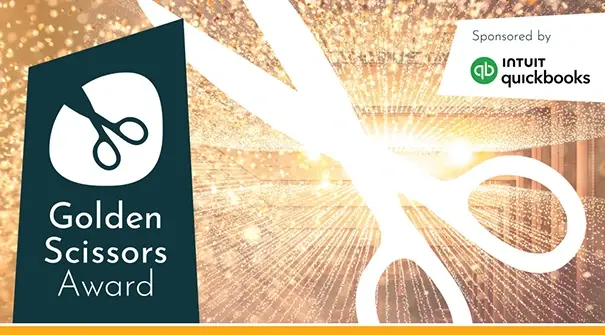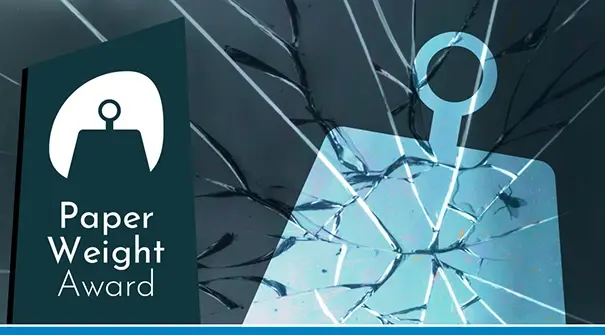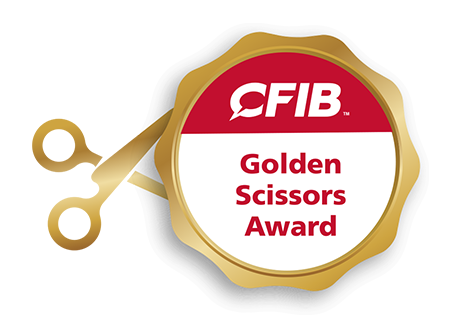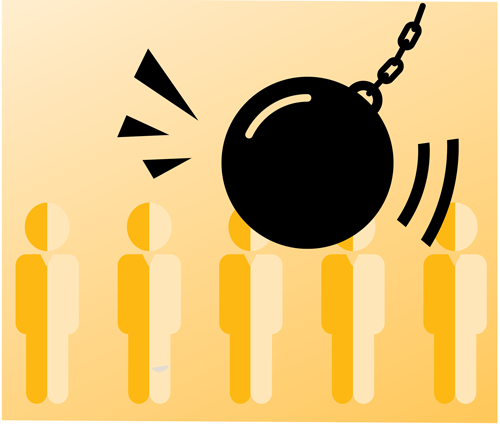CFIB’s Red Tape Awareness Week™ sheds light on the confusing rules and regulations, administrative obstacles, excessive paper burden, and poor customer service Canadians face every day from all levels of government. Our goal is to raise awareness about the red tape challenges that currently exist with politicians and policy makers to encourage positive changes that will boost productivity, improve affordability, and create a landscape where small businesses can thrive.
Our 17th year of RTAW™ runs January 26 –30, 2026, highlighting the impact of red tape on both business owners and everyday Canadians through a new report looking at the administrative burden on Canadian physicians, a snapshot of red tape in the agriculture sector, and our annual Golden Scissors and Paperweight awards, and our much anticipated Red Tape Report Card.
Red Tape Awareness Week™ 2026 is presented in partnership with Intuit QuickBooks.
2026 Red Tape Awareness Week Challenge
In 2025, CFIB challenged every government in Canada (federal, provincial/territorial and municipal) to publish all permit, form and application wait times, and to implement a service standard associated with each.
RTAW 2026 follows up on this and challenges all governments to take accountability by introducing service standards with guarantees where if a permit, form or application is not processed within a certain amount of days, the associated fee is reduced/refunded.
For 15 years, Red Tape Awareness Week™ has shed light on the confusing rules and regulations, administrative obstacles, excessive paper burden, and poor customer service Canadians face every day from all levels of government. From January 29 – February 2, CFIB will highlight the impact of red tape on both business owners and everyday Canadians through our Golden Scissors and Paper Weight awards, our annual Red Tape Report Card, and other red tape research. Our goal is to raise awareness about the red tape challenges that currently exist with politicians and policy makers to encourage positive changes that will make life simpler for Canadians and create a landscape where small businesses can thrive.
Do you have a red tape concern that you want government to fix? CFIB has successfully advocated for many Canadian governments to create a reporting mechanism where citizens and business owners can share their #RedTape headaches.
Take your #RedTape concerns straight to government!
Losing doctors to desk work: Canadian physicians lost 20 million hours each year to red tape
Did you know Canadian physicians lose approximately a month of work time to unnecessary administrative burden every year? As of 2025, Canadian physicians report spending nine hours every week on administrative tasks, totalling 42.7 million hours annually on average across the country. Nearly half (47%) of this time, or 19.8 million hours, is spent on unnecessary tasks. CFIB teamed up with the Canadian Medical Association to tackle this issue.
Learn how red tape ties up Canada’s health care system and what governments can reduce it our new report!
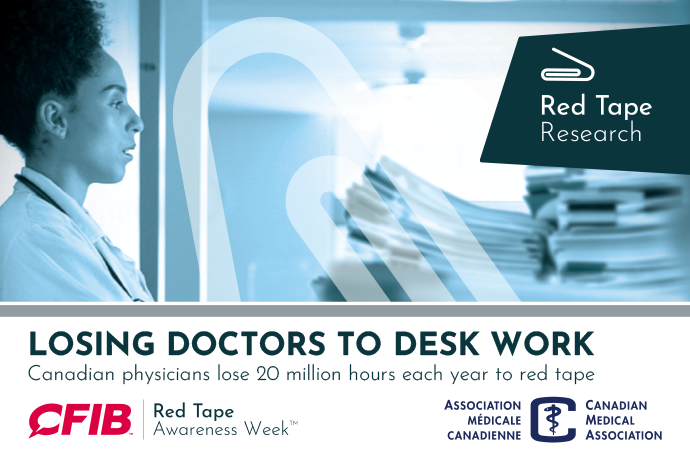
See the Grades
Each year CFIB grades the provinces and the federal government on their red tape reduction efforts.
Check out the grades in our 2026 Red Tape Report Card!
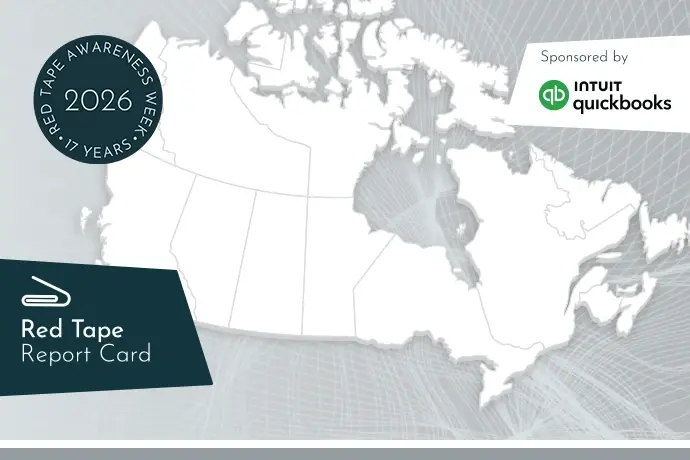
Fields of Paperwork: Red Tape in Agriculture
Canadian agriculture businesses are drowning in paperwork. Farmers say complex rules and endless approvals are slowing growth and making it hard to stay competitive. Our latest snapshot explores the biggest regulatory pain points and offers practical steps governments can take to cut red tape to keep agriculture thriving.
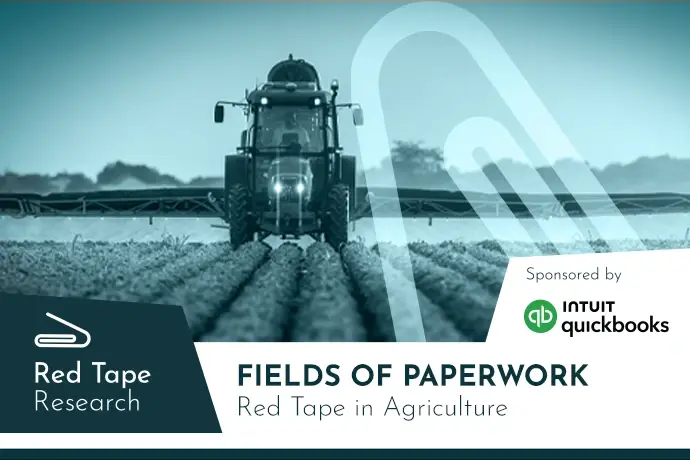
Patients Before Paperwork
Did you know Canadian physicians spend an estimated 18.5 million hours on unnecessary paperwork every year? Reducing that burden by just 10% would free up the equivalent of 5.5 million patient visits.
New report spotlights governments that accepted CFIB’s challenge to reduce red tape in health care.
2024 report now available!

See the Grades
Each year CFIB grades the provinces and the federal government on their red tape reduction efforts. Check out how each jurisdiction measures up!
2024 Red Tape Report Card now available!
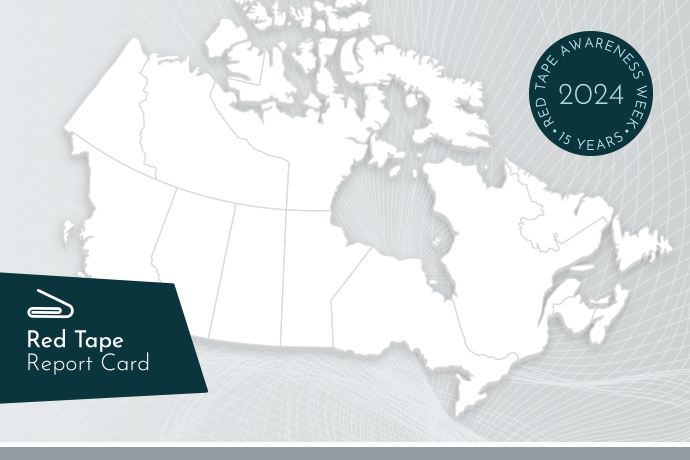
Flushing out the Nonsense
Canada is facing a housing shortage. Reducing red tape around building is one way to help combat the shortage. In our latest report, CFIB examines permitting costs and requirements for upgrading a powder room to a full bathroom in 12 Canadian municipalities, highlighting best practices and areas for improvement.


Healthcare Report
Did you know doctors spend an estimated 18.5 million hours on paperwork every year? Reducing that burden by just 10% would free up the equivalent of 5.5 million patient visits! Check out our groundbreaking report Patients over Paperwork for more on cutting red tape in the healthcare system.
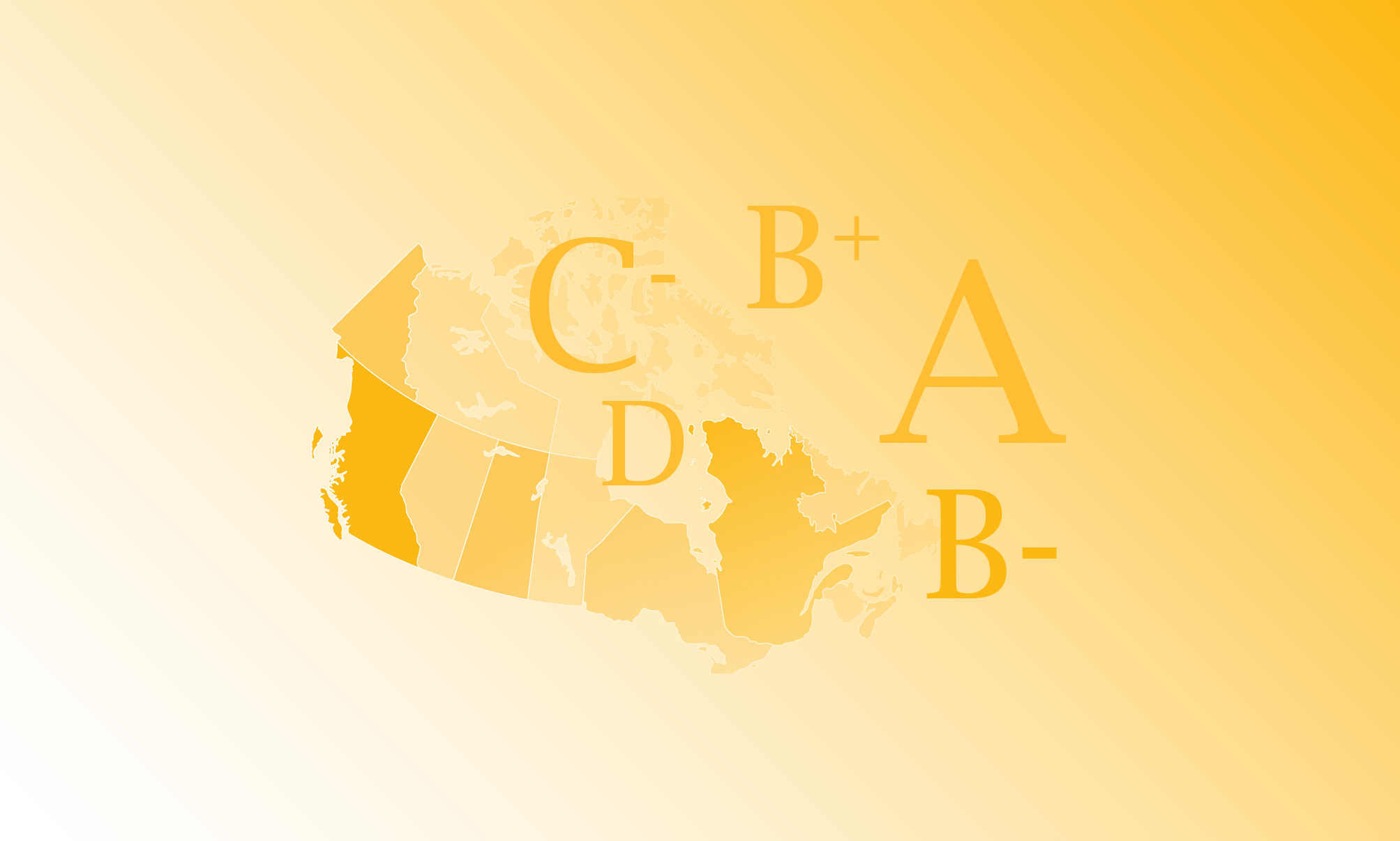
See the Grades
The Grades are in! Check out which governments are leaders in cutting red tape and which ones are in detention in our 2023 Red Tape Report Card!
Learn More About the #RedTape Award Winners:
CFIB’s prestigious Golden Scissors Award recognizes individuals or teams who have successfully motivated others to take action or produced meaningful, positive results in cutting red tape. This year’s award goes to the Government of Alberta for speeding up approvals through its Automatic Yes toolkit. Check out which policies are “ones to watch” plus an honourable mention.
The Paperweight Award is the award no one wants to win. It shines light on some of the worst examples of useless and excessive regulations for business owners across the country. This year’s award goes to the Canadian Border Services Agency (CBSA) for the rollout of their ‘CARM’ system. Want to see who else made the list? Check out this year’s other honourees.
Learn More About the #RedTape Award Winners:
CFIB’s prestigious Golden Scissors Award recognizes individuals or teams who have successfully motivated others to take action or produced meaningful, positive results in cutting red tape.
New winner(s) will be announced on January 30.
The Paperweight Award is the award no one wants to win. It shines light on some of the worst examples of useless and excessive regulations for business owners across the country.
The 2026 winner(s) will be announced on January 27.
Learn More About #RedTape:
The Golden Scissors Award is a prestigious national CFIB award that recognizes individuals or teams who have successfully motivated others to take action or produced meaningful, positive results in cutting red tape. Find out who is taking CFIB’s top prize for cutting red tape!
Remember those lines that stretched city blocks outside of passport offices? 80% of passport applicants experienced frustrations, from multiple trips to Service Canada to taking time off work and delaying travel plans. The government of Canada’s passport mess is this year’s paperweight award winner.
CFIB has been putting your red tape issues in the spotlight and holding governments accountable through the years. From previous Red Tape reports, research and awards, you will see how CFIB has been fighting to combat red tape.
Read Our Latest on #RedTape
- All
Read Our Latest on #RedTape
- All
Read Our Latest on #RedTape 2023
- All
Frequently Asked Questions
1. What is Red Tape Awareness Week?
Red tape reduction is consistently cited as a top three priority for small business owners. Each year, we dedicate one week in January to raise public awareness about how excessive regulations and red tape affect business owners and everyday citizens, and challenge politicians and bureaucrats across the country to take action to remove unnecessary burden. CFIB first launched Red Tape Awareness Week 16 years ago.
Red Tape Awareness Week 2026 takes place January 26 - January 30, 2026.
2. What is “red tape”?
Red tape refers to government laws, policies and rules that are excessive, duplicative and/or unnecessary, and generate a financial or time cost to comply with.
While government spending and taxes get a lot of scrutiny on a regular basis, regulation is too often an afterthought. Red Tape Awareness Week attempts to rectify that by putting a spotlight on the laws, rules and regulations that govern our everyday lives to ensure they deliver the desired results while minimizing wasted time, money and stress for those that are complying.
Regulatory modernization means staying on top of outdated or redundant rules. Eliminating them where possible and improving them where necessary, as well as ensuring that they are simple to understand and easy to follow.
3. What is this year’s theme?
The theme for Red Tape Awareness Week 2026 is “cutting red tape, cutting costs: a simpler Canada in uncertain times”.
In uncertain times, governments can’t control global markets or inflation—but they can control red tape.
Every needless form, permit, or delay drives up costs and wastes time for businesses, health care, housing, and everyday Canadians. By simplifying rules and speeding up approvals, governments can lower costs, boost productivity, and give Canadians more time for what matters.
4. What does this year’s lineup include?
The 17th annual Red Tape Awareness Week lineup includes a new report on physician administrative burden; the announcement of the Paperweight Award “winner”; the 2026 Red Tape Report Card; a look at red tape in agriculture; and the Golden Scissors Award winner announcement.
5. What is the Red Tape Report Card?
The centerpiece of Red Tape Awareness Week is our Red Tape Report Card.
The report card grades the federal and provincial governments in three key categories: regulatory accountability (are governments measuring and tracking their regulations?); regulatory burden (how many regulations are there?); and regulatory leadership (is red tape reduction a clear priority for the government?).
CFIB wants to ensure governments are actively progressing and improving in these categories. In some provinces that means asking governments that do not know how many rules and regulations exist to begin counting them. In provinces that have that covered, it may mean focusing on reducing that number where possible or improving leadership by creating dedicated ministries or offices for red tape reduction. Overall, we are looking to all Canadian governments to reduce the regulatory burden on both small businesses and citizens.
6. How are governments graded?
The 2026 Red Tape Report Card uses an index approach to measure and rank the regulatory performance of Canada’s governments based on three priority areas of regulatory activity (or subindexes), which encompass 12 indicators. These indicators represent either a composite of multiple scores, or a stand-alone value. The methodology for the 2026 Red Tape Report Card will mostly mirror the methodology used in the 2025 version.
For more details on how scores were calculated, refer to the methodology section in appendix A of the report.
7. What is the Golden Scissors Award?
The Golden Scissors Award is a prestigious CFIB award that recognizes individuals or teams who have successfully motivated others to take action or produced meaningful, positive results in cutting red tape.
8. What is the Paperweight Award?
The Paperweight Award is an award no one wants to win. It shines light on some of the worst examples of useless and excessive regulations for business owners across the country.
9. How are winners decided?
For the Paperweight Award, CFIB looks at news stories, member feedback and examples raised by governments and opposition parties as being particularly bad instances of red tape. Internal deliberation determines which example or examples win and are featured as Paperweight Award winners.
The Golden Scissors Award works the same way (though rarely via examples from opposition parties), and CFIB assesses internally which examples had the biggest impact in reducing red tape.
10. Who won the awards last year?
The Government of Manitoba took home the Paperweight Award for repealing the Regulatory Accountability Act, eliminating two key mechanisms that shielded them from regulatory overload. For more information, visit cfib.ca/paperweight.
While no government took the Golden Scissors Award in 2025, CFIB recognized promising initiatives with two “Ones to Watch” Awards and an honourable mention. Read more at cfib.ca/goldenscissors.
11. Where can I learn more about Red Tape Awareness Week?
Visit cfib.ca/redtape and follow CFIB’s social media channels to stay up to date on our initiatives.




